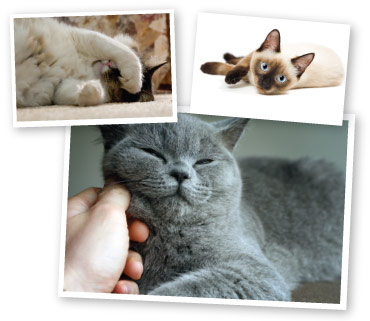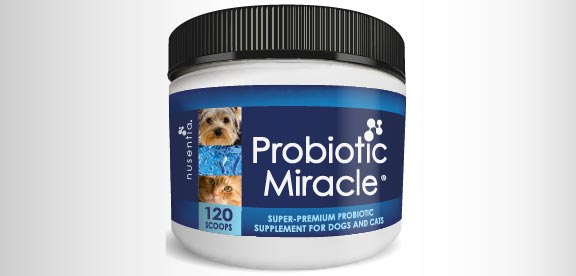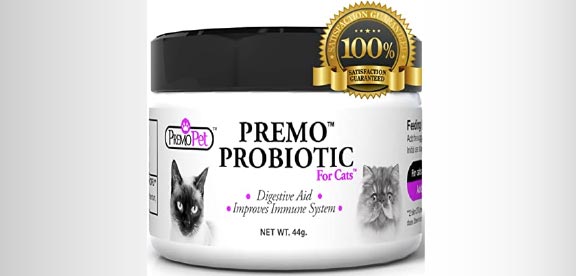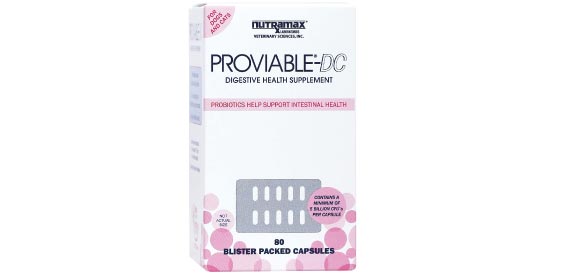How to NOT Waste Your Money on Cat Probiotics
Good to know facts before buying a probiotic supplement for your cat.
Cat probiotics are a new healthy trend in feline nutrition. The truth is, probiotics are great for cat digestive health and maintaining wellness, but not all products are equally beneficial for them. On top of that, there are products and cat foods coming out all the time online, and at PetSmart, that supposedly include probiotics. Can we trust them? With so much convoluted information, we wanted to know which products are really good for our kitties, which products were feline-appropriate (biologically appropriate for cats), and which probiotics will truly fortify excellent cat health.
NOTICE:
Problem #1:Low Efficacy
Cat foods and treats with probiotics added have been found to have far less, if any, actual viable bacteria.
Problem #2: Not Biologically Appropriate for Cats
Most probiotic supplements for cats are actually human supplements with a cat-friendly label attached. A cat's digestive system is much different from that of a human, so giving your cat the wrong kind of probiotic could be a big mistake, or at the very least, a big waste of money. (We'll give you a couple tips on how to identify a human-intended probiotic below)
The Best Probiotics Help With:
- Yeast infections
- Obesity
- Skin rashes, dermatitis
- Urogenital tract infections
- Irregular bowel function (diarrhea, loose stool, or constipation)
- Excessive shedding
- Production of natural digestive enzymes
- Production of B vitamins
5 Things to Look for in the Right Product
1. Choose dry powder probiotic supplements.
Powders are the most stable form of healthy bacteria. They are more desirable than liquids, tablets, pastes, or treats. More natural probiotics can be contained in a tiny scoop of powder than in any other supplement form, and, because it's in a dry, suspended state, the viable microorganisms can live for over a year if stored in the right conditions.
2. Not too many species (strains) of bacteria, please!

Keep in mind that bacteria is alive. When attached to the intestine, these living microorganisms compete with eachother to dominate the GI tract, and, some species live together more harmoniously than others.
Also, its important to know that only a few species have been studied to be helpful for feline health, so choosing a probiotic with 6 species or less is a wise choice and will likely be more feline-appropriate. This ensures that the valuable species are not diluted by the speculative ones. Loading your cat up with a super-complex probiotic formula could cause feline GI upset, or at the very least, be a total waste of money.
3. Look for prebiotics in the formula
There are all kinds of materials used as "prebiotics", such as, FOS, inulin fiber, or acacia gum, but essentially, their purpose is to enhance the activity of natural probiotics, giving them food to eat and multiply. Prebiotics are an absolute must for any probiotic supplement, but especially for obligate carnivores, like cats.
4. Don't super-load the CFU!
Its easy to see that pet probiotics with dosages are all over the map. You can find products that offer 100 million all the way to 60 billion CFU per dose. Wow! If you see a "cat probiotic" with a CFU/dose anywhere above 10+ Billion per dose, you can bet it's a human — NOT feline-appropriate. So what's the right dosage?
Remember that your cat is tiny, and has a very efficient digestive tract. Our findings are that around 500 million CFU is per day is perfect for maintaining wellness in cats. If recovering from antibiotics or illness, your cat could use 2-4 times that amount. It's true that it's hard to overdo it with dosage, but easy to waste your money by overdoing probiotics. It's just not necessary. Don't do it.
5. Read the reviews
A probiotic is either going to work or it isn't. Whether it's diarrhea, yeast, itching, allergies, or whatever, check out the reviews and see if other cat owners with your issue have had success.
Our Recommendation
The following product(s) qualify as our favorite probiotics from our cat community. Some of the manufacturers have been so kind as to supply our readers with a coupon, see below:
Top Sellers in Cat Probiotics
Recommended Products (2020 Review)
![1]() Probiotic Miracle®
Probiotic Miracle®
Editor's choice

| Criteria | Score |
| Stability | |
| Quality | |
| Appropriateness | |
| Usability | |
| Palatability | |
| Overall Value |
Description
From Nusentia, Probiotic Miracle® is a highly rated cat probiotic supplement. It is a feline appropriate formula with many years of use in veterinary practice treating digestive issues in cats.
Features:
- Made in USA
- Biologically appropriate for cats
- Non-dairy
- Gluten free
- No byproducts
- No fillers
- Over 10 years veterinarian recommended
Specifications:
- 5 stars
- Brand: Nusentia® Probiotic Miracle®
- Approximately $0.13 per billion CFU
- 44 grams (120 servings)
- Includes premeasured scoop
Our Review
The three attributes we loved about Probiotic Miracle were the formula, the price, and the consumer rating. The formula has cat appropriate species and no additives. This makes the serving size very small and just about undetectable to your cat. The price, at $0.13 per serving is very affordable. One canister will last about 6 months or longer. Lastly, with 10 years of consumer reviews, this product has stood the test of time.
We tested this on our cats, and they had no trouble eating their food with the powder mixed in. In fact, we couldn't even see it after it was mixed.
![2]() Premo Pet Probiotic for Cats
Premo Pet Probiotic for Cats
Second Pick

| Criteria | Score |
| Stability | |
| Quality | |
| Appropriateness | |
| Usability | |
| Palatability | |
| Overall Value |
Description
From Premo Pet, Premo Probiotic for Cats is a healthy and natural choice for feline digestive and immune support. This is a veterinarian approved product manufactured in the USA. Consumer rating is high, and, like Probiotic Miracle, has no additives or fillers.
Features:
- Made in USA
- Biologically appropriate for cats
- Non-dairy
- Gluten free
- No byproducts
- No fillers
Specifications:
- 4.5 stars
- Brand: Premo Pet
- Approximately $0.17 per billion CFU
- 44 grams
- Includes pre-measured scoop
Our Review
Premo Pet Probiotic for Cats is easy to use. We liked the uncomplicated formula that was clear of any byproducts, fillings, or flavors. Our cat test went well, and all our cats ate their food right up.
![2]() Proviable-DC for Dogs and Cats
Proviable-DC for Dogs and Cats
Third Pick
| Criteria | Score |
| Stability | |
| Quality | |
| Appropriateness | |
| Usability | |
| Palatability | |
| Overall Value |
Description
From Nutramax, Proviable-DC offers an incapsulated supplement with significant amounts of beneficial bacteria for dogs and cats.
Features:
- Made in UK
- Biologically appropriate for cats
- Non-dairy
- No byproducts
- No fillers
Specifications:
- 4.5 stars
- Brand: Nutramax
- Approximately $0.45 per capsule
- 90 count capsules
Our Review
We liked Proviable-DC for its purity, efficacy, and appropriateness for pets. We chose this product for its formula and consumer rating. We rated it last because of its cost and rigidity of serving size. You'll have to use a full capsule each time unless you want to risk contaminating the microorganisms. That said, capsules are probably the most effective way to maintain efficacy. We just didn't like wasting product. 5 Billion CFU is a little high for a cat in our opinion.
Cites and References
- Anaerobe. 2015 Aug;34:14-23. doi: 10.1016/j.anaerobe.2015.04.002. Epub 2015 Apr 8. Microbiota and probiotics in canine and feline welfare. Grześkowiak Ł1, Endo A2, Beasley S3, Salminen S4.
- Probiotic Enterococcus faecium Strain Is a Possible Recipient of the van A Gene Cluster
Clin Infect Dis. (2001) 32 (9): 1384-1385.
doi: 10.1086/319994
https://cid.oxfordjournals.org/content/32/9/1384.full - Transition of Enterococcus faecium from commensal organism to nosocomial pathogen.
Future Microbiol. 2009 Nov ;4(9):1125-35. doi: 10.2217/fmb.09.82.
https://www.ncbi.nlm.nih.gov/pubmed/19895216 - Probiotics and prevention of atopic disease: 4-year follow-up of a randomised placebo-controlled trial Marko Kalliomäki, MD, 31 May 2003 https://dx.doi.org/10.1016/S0140-6736(03)13490-3
- Weese, J. Scott, and Luis Arroyo. "Bacteriological evaluation of dog and cat diets that claim to contain probiotics." The Canadian Veterinary Journal 44.3 (2003): 212.
 Probiotic Miracle
Probiotic Miracle Premo Pet Probiotic for Cats
Premo Pet Probiotic for Cats Proviable-DC for Dogs and Cats
Proviable-DC for Dogs and Cats